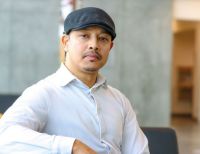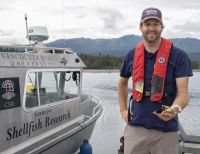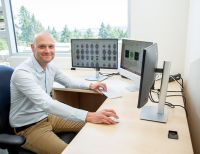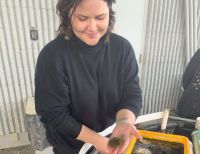As a new school year begins, educators are looking at how AI tools like Chat GPT will change teaching and learning. Also in this issue:
Climate action experts
Should cellphones be allowed in the classroom?
How a VIU prof's research could change cancer treatments
Featured experts
Cellphones and AI in the classroom
As students head back to school, a debate is raging about bringing two different technologies into the classroom – both of which some educators worry may be detracting from students’ ability to learn. Some schools are banning cellphone use in the classroom, and many educators are talking about ways students can use (or not use) AI tools like ChatGPT to help them complete assignments or study.
Julia Hengstler
sets out expectations about using AI as aids for learning or to help produce assignments right in her course syllabus. She also wonders about how a cellphone ban in the classroom might set the tone for managing use of these devices later – when those students graduate and are in the workplace.Education Professorsets out expectations about using AI as aids for learning or to help produce assignments right in her course syllabus. She also wonders about how a cellphone ban in the classroom might set the tone for managing use of these devices later – when those students graduate and are in the workplace.
connects the emergence of tools like ChatGPT to other trends in how learning and assessment are shifting in BC schools already. As a former high school teacher, she also has direct experience in the benefits and drawbacks of attempts to ban cell phones in classes.Education Professor Dr. Paula Waatainen connects the emergence of tools like ChatGPT to other trends in how learning and assessment are shifting in BC schools already. As a former high school teacher, she also has direct experience in the benefits and drawbacks of attempts to ban cell phones in classes.
Climate action experts
Michele Patterson, a VIU Geography Professor, and Simon Hazel Maguire, a student and VIU Eco-Club member, are organizing a Climate Action Fair on campus on September 21. They can talk about what universities can and should be doing to combat climate change.
Geography Professor Dr. Jeff Lewis, a member of the Awareness of Climate change through Education and Research (ACER) project, is delivering the second talk in VIU ElderCollege’s Saturday Speaker Series. His October 21 talk, How to avoid more extreme climate change, will outline things we can do about climate change, individually and as active citizens electing and supporting strong leaders.
VIU in the news
Climate anxiety
“Climate change is a mental health concern. It’s more than an environmental phenomenon, it’s also a risk to mental health." VIU Psychology Professor Dr. Lindsay McCunn spoke with Canadian Press about climate anxiety, which she says is becoming more common. Read more.
Rooms for students
Michael Witcomb, VIU's off-campus housing coordinator, is calling on people to open up their homes to students this fall. “It's a great way to bring some extra income into the household in times when all of our grocery budgets are being squeezed.” Read more in this CHLY article.
Back-to-the-land movements
VIU English Professor Dr. Toni Smith recently commented on farming influencers. She said fantasizing about agrarian life is nothing new. History presents cyclical “back-to-the-land” movements. Read more.
Cancer research funded
A big donation is helping a team of researchers on Vancouver Island work on a project focusing on the origin and behaviour of cancer. The Spatial Metabolome Hubble Project, which is co-led by VIU Chemistry Professor Dr. Kyle Duncan, is receiving $2.4 million from the Terry Fox Research Institute. Read more in Black Press and CHEK news.
VIU events
Taking individual action on climate change
VIU ElderCollege’s Saturday Speaker Series includes three presentations that invite community members to learn more about how they can take action on climate change as individuals. Participate online or in-person at the VIU Parksville centre. The lineup:
September 9 (online only): Environmental psychology, climate change and the benefits of nature: Psychology Professor Dr. Lindsay McCunn discusses how psychology can address and examine climate change, climate anxiety and the benefits of nature.
October 21: How to avoid more extreme climate change: Geography Professor Dr. Jeff Lewis shares things we can do about climate change, individually and as active citizens electing and supporting strong leaders.
November 18: Climate action initiatives: Mount Arrowsmith Biosphere Region: Graham Sakaki describes the initiatives the Mount Arrowsmith Biosphere Region Research Institute engages in to protect and preserve this unique and valuable ecosystem.
















